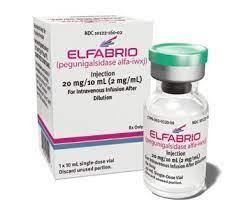Elfabrio
Pronunciation: ell-fab-ree-oh
Generic name: pegunigalsidase alfa-iwxj
Dosage form: vial for intravenous infusion
Drug class: Lysosomal enzymes
What is Elfabrio?
Elfabrio (pegunigalsidase alfa-iwxj) is an enzyme replacement treatment that may be used long-term to replace missing enzymes in adults with Fabry disease.
- Fabry disease is a rare, inherited condition where people do not make enough of the alpha-galactosidase-A enzyme. Fabry disease is also known as alpha-galactosidase-A enzyme deficiency or Anderson-Fabry disease.
- Elfabrio is made by a process called PEGylation (peg-eh-lay-shun) which extends how long Elfabrio lasts in the body.
Elfabrio works by replacing the missing alpha-galactosidase-A in people with Fabry disease. Without this enzyme, people with Fabry disease can't break down fats properly, leading to a build-up of a fatty substance called globotriaosylceramide (Gb3). A build-up of Gb3 leads to an increased risk of heart problems, strokes, and kidney failure and causes symptoms such as numbness, pain, intolerance to temperature changes, dizziness, and flu-like symptoms. Elfabrio's mechanism of action means it helps break down Gb3 and prevents its buildup.
Elfabrio gained FDA approval on May 9, 2023.
Elfabrio side effects
The most common side effects of Elfabrio are:
- infusion-related reactions
- common cold
- headache
- diarrhea
- fatigue
- nausea
- back pain
- pain in the limbs
- sinus infection.
Symptoms of an infusion-related reaction to Elfabrio vary and may include:
- hypersensitivity (allergic reactions)
- nausea, or vomiting
- itchy skin, skin redness, or a rash
- dizziness or feelings of weakness
- pain
- sneezing, shortness of breath, or nasal congestion
- throat irritation
- chest, abdominal or muscle pain
- diarrhea
- burning sensation
- nerve pain, tingling, or numbness
- headache
- shaking movements or agitation
- increased body temperature, flushing, or chills
- slow heart rate
- muscle pain
- high and low blood pressure.
If severe infusion-related reactions occur your healthcare provider will stop Elfabrio and start appropriate medical treatment.
Serious side effects and warnings
Elfabrio carries a Boxed Warning for hypersensitivity reactions, including anaphylaxis.
Severe allergic reactions (hypersensitivity reactions), including anaphylaxis, may occur during and after Elfabrio treatment. If severe allergic reactions or anaphylaxis occurs during treatment, your healthcare provider will immediately stop the infusion and provide appropriate medical care. If these reactions should occur after treatment, seek immediate medical care.
Kidney problems. Your healthcare provider will do blood and urine tests to check your kidney function during treatment with Elfabrio, especially if you experience symptoms like swelling or changes in urine output. If kidney problems are suspected, stop taking Elfabrio and seek medical evaluation.
These are not all the side effects that can happen with Elfabrio. See the Elfabrio Package Insert for a full list of side effects. To report suspected side effects, contact Chiesi USA, Inc. at 1-888-661-9260 or the FDA at 1-800-FDA-1088 or www.fda.gov/medwatch.
Related/similar drugs
Before taking Elfabrio
You should not take Elfabrio if you have had an allergic reaction to Elfabrio, pegunigalsidase alfa, or any of the inactive ingredients in the infusion.
Before taking Elfabrio, tell your healthcare provider about all your medical conditions including if you:
- have kidney disease
- have had infusion reactions in the past
- have an infection
- take any other medications
- are pregnant or intending to become pregnant
- are breastfeeding.
Pregnancy
There is no human data regarding the use of Elfabrio during pregnancy but because it is an enzyme replacement treatment it is not expected to cause any adverse outcomes. Animal reproduction studies have reported no adverse effects.
If a patient becomes pregnant while receiving Elfabrio, healthcare providers or patients should report the pregnancy to the pregnancy safety study that monitors pregnancy outcomes, call Chiesi USA, Inc. at 1-888-661-9260 or chiesirarediseases.com/contact-us/medical-information-form.
Breastfeeding
Breastfeeding while taking Elfabrio is not recommended. There is no information about the safety of Elfabrio for breastfeeding infants. It's best to avoid breastfeeding while taking this medication.
Children
The safety of Elfabrio in children has not been established.
How is Elfabrio administered?
Elfabrio is administered as an intravenous infusion by a healthcare provider.
- Elfabrio is infused once every two weeks.
- The recommended Elfabrio dosage is 1 mg/kg every 2 weeks.
- Pretreatment with antihistamines, antipyretics, and/or corticosteroids may be considered to reduce the risk of infusion-related reactions and you will be monitored for one to two hours after the infusion.
What other drugs will affect Elfabrio?
Interaction studies have not been conducted with Elfabrio.
Elfabrio ingredients
Active ingredient: pegunigalsidase alfa-iwxj 2 mg/mL
Inactive ingredients (per mL): pegunigalsidase alfa-iwxj (2 mg) anhydrous citric acid (0.2 mg), sodium chloride (7.06 mg), sodium citrate (6.73 mg), and Water for Injection, USP.
The pH is approximately 5.9 to 6.4.
Available as 20 mg/10 mL or 5 mg/2.5 mL (2 mg/mL) solution in a single-dose vial.
Who makes Elfabrio?
Chiesi Farmaceutical S.p.A makes Elfabrio.
Elfabrio Biosimilars
Biosimilar and interchangeable products are biological products that are highly similar to and have no clinically meaningful differences from the reference product.
Reference products
These are biological products that have already been approved by the FDA, against which biosimilar products are compared. There is 1 for Elfabrio.
Elfabrio (pegunigalsidase alfa-iwxj) - Chiesi Farmaceutici S.p.A.
| Formulation type | Strength |
|---|---|
| Single-Dose Vial | 20 mg/10 mL (2 mg/mL) |
| Single-Dose Vial | 5 mg/2.5 mL |
More about Elfabrio (pegunigalsidase alfa)
- Check interactions
- Compare alternatives
- Reviews (1)
- Drug images
- Side effects
- Dosage information
- During pregnancy
- FDA approval history
- Drug class: lysosomal enzymes
- Breastfeeding
- En español
Professional resources
Related treatment guides
Further information
Always consult your healthcare provider to ensure the information displayed on this page applies to your personal circumstances.

